News
July 1, 2020 - 28 new COVID-19 patients in Montenegro, 249 active cases
In the last 24 hours, the Institute of Public Health laboratories completed the analysis of 190 samples for the new coronavirus, among which 28 results were positive. These are patients from Gusinje (12), Podgorica (10), Bar (4), Cetinje, and Bijelo Polje 1 each.
Of the 28 newly discovered, 18 were contacts of previously confirmed cases, while in ten patients the source of the infection is as yet unknown.
Active COVID-19 cases by municipalities:
Thirty-nine COVID-19 patients in hospitals
"There are 14 patients in the Clinical Center. Two of them are in critical condition. Seven patients are in Bar hospital. There are 18 patients in Berane, 2 of whom are in critical condition. This data should be a warning. Compared to the same day in the previous wave of infection, the number of patients is much higher now, and transmission is faster," says Dr. Eraković. He pointed out that the healthcare system is fully prepared.
Borders with Serbia to be open when conditions allow, set of measures for tourists prepared
Director of the Institute for Public Health, Dr. Boban Mugoša, warned that measures to curb the COVID-19 spread "must be obeyed."
"Persons in self-isolation must stay in isolation. We have provided so many recommendations, instructions, orders. If we adhere to that, our response to the infection will be effective. We are opening in line with European standards. Some European countries have not opened their borders to us, and that's fine, they can do whatever they think is correct. I was asked why we haven't opened borders to Serbia, Bosnia, and Herzegovina. The answer is clear- every country assesses its capacities, its system, and how many tourists are allowed to come from every individual country," Dr. Mugoša said.
Dr. Mugoša recalled that events that carry a high epidemic risk had been banned. "Due to events that represented an epidemic explosion, we had to take such measures," Dr. Mugoša says. For now, sporting events will be banned.
Dr. Mugoša recalled they had prepared a set of measures for tourists who come to visit Montenegro. "Software to which a tourist will be connected will allow us to track them when they arrive in our country," he pointed out.
Speaking about measures, he said that health comes first. "We have two forms of risk - contagious disease and poverty. The lockdown we had previously cannot be applied anywhere. Under the present circumstances, we are using effective and well-planned measures and these will produce results only if we adhere to them, "Dr. Mugoša pointed out.
Borders of not all EU countries are open for the citizens of Montenegro
Although the EU Council decided yesterday to open the borders for the citizens of 14 countries outside the Union, each of the member states was allowed to decide on the issue independently. Austria remains closed to citizens of the Western Balkans, while Germany has decided to exclude four countries from the EU list, including Serbia.
Austrian Foreign Minister Alexandar Schallenberg (OVP) said today that they were worried about the first steps towards opening borders to the Western Balkans and that the planned opening of borders was being withdrawn for Serbia, Montenegro, BiH, Kosovo, Albania, and Northern Macedonia. He also advised Austrian citizens not to travel to these countries and issued the highest warning, urging them to leave these countries if they had already arrived.
From today, the citizens of Montenegro can go to Germany, the citizens of Serbia cannot
Germany announced today that it is easing the restrictions for the arrival of passengers from 11 countries that are not members of the European Union (EU), including Montenegro, the Associated Press agency reported.
Yesterday, the EU Council adopted recommendations on the gradual opening of EU borders for citizens of 14 countries from July 1, including Montenegro and Serbia. Still, Germany did not accept the complete list.
Montenegro remained on the list, whereas Serbia, Algeria, Morocco, and Rwanda were left out.
Sources: Institute of Public Health, Government of Montenegro, republicworld.com
Active COVID-19 cases by municipalities:
Anti-COVID-19 measures for the next seven days
The EU is opening borders for Montenegrin citizens and 13 other countries
No additional conditions for entry of EU residents
After opening to the EU, the NKT will subsequently decide on opening borders with other countries
Mugoša: COVID-19 infection is present and will be present
Enhanced compliance with special self-isolation commands
Donations - no new expenses
June 29, 2020 - Political Analyst and Director of Centre for Civic Education (CCE) Daliborka Uljarević, appearing as a guest on "Colours of the Morning" (Boje Jutra), said that “we haven’t made headway on some of the basic conditions that were in place in 2011 during the opening of negotiations with EU. Pierre Mirel, former long-term director of the European Commission's Directorate-General for Enlargement, speaking to Vijesti, highlighted similar issues."
Some eight years after beginning negotiations for accession to the European Union, Montenegro has made no progress, believes the political analyst and Director of the Centre for Civic Education.
Uljarević, speaking on "Colors of the Morning", said that “we have not made headway on some of the basic conditions that were in place in 2011 during the opening of negotiations.
Pierre Mirel, former long-term director of the European Commission's Directorate-General for Enlargement, speaking to Vijesti, highlighted similar issues.”
"We often hear in government speeches, and sometimes also among other voices in the country who do not know the process of European integration, that they want to support some kind of justification, stating that the EU is in some way to blame for the fact that eight years after the start of negotiations we have opened not all, but 32 of the chapters, and that we have temporarily closed three. This is what Pierre Mirel previously called the Montenegrin paradox, because it has not been seen in the process of European integration so far," Uljarević said.
Uljarević added that the EU is not to blame for this, and that when we compare the speed with which the countries of Eastern Europe joined the EU, and even some countries of the former Yugoslavia, there is one reason for our "snail's pace".
"That's what Mirel underlines. There, there was clear political will to transform societies. That is what we do not have here and that is what will have to change in the near future. We are committed to the new methodology, it can bring a lot of benefits to Montenegro, but if we continue to behave like we are now, we may see a point where the process starts going backwards; all the progress is indeed related to the rule of law,” said Uljarević.
As paradoxical as it may seem for the situation in Montenegro, we can go back to 2011 when we received the conditions for the start of negotiations.
"The European Parliament also pointed out the problems at that time. Concerns were expressed then within the European Parliament due to the excessive concentration of power in the judiciary; then they were specifically referring to the judiciary and the mandate of Ms. Medenica. This year, the assessment has been exactly the same. The third mandate is a subject of controversy, and the government’s approach is really an affront to common sense," said Uljarević.
The Director of the CCE says that this is possible only here because everything is subordinate to single-party and vested interests.
"Our problems are recurring. There is no report relevant to at least some extent, published in the past year, in which the issues pointed out by us in civil society as well as the media have not been completely swept under the carpet by the government, who refuses to change anything. These run from the judiciary through topics related to the Agency for Prevention of Corruption. That agency cannot be truly independent with a Council elected by the self-ruling majority,” said Uljarević.
Uljarević added that amendments to the law must be made, which will enable true representatives of civil society to sit on the Council, people who are independent, and not those who are bound by bureaucratic conditions and who, as individuals elected by the authorities, would serve to maintain their status.
Since mid-June, 174 cases of COVID-19 have been registered in Montenegro, by municipalities:
COVID-19 confirmed at kindergarten in Tivat
European Union to Publish List of 15 Non-Member Countries Whose Citizens Will be Allowed to Enter EU from July
Spanish Foreign Minister Aranca Gonzalez Laja said that the European Union is compiling a list of 15 non-member countries whose citizens will be able to travel to the EU from Wednesday.If the EU criteria are adopted, citizens of Serbia, BiH, and Russia will not be able to enter Montenegro.
Number of COVID-19 patients by municipalities:
Two COVID-19 patients die
NKT: Further opening of borders will be harmonized with EU decisions
June 28, 2020 - The fact that the main tourist season will this year bypass Montenegro's tourism capital is not the only thing currently on the minds of the citizens of Budva and indeed the rest of Montenegro. In one of only three opposition municipalities in Montenegro, political conflicts have been ongoing for a month now, and have partly spilled over into the streets of Budva. The Montenegrin police are actively involved in the entire process.
A brief summary would not do justice to the complexity of the situation, so here we will provide you an overview of the most important events that have marked the beginning of a "hot political summer" in Montenegro.
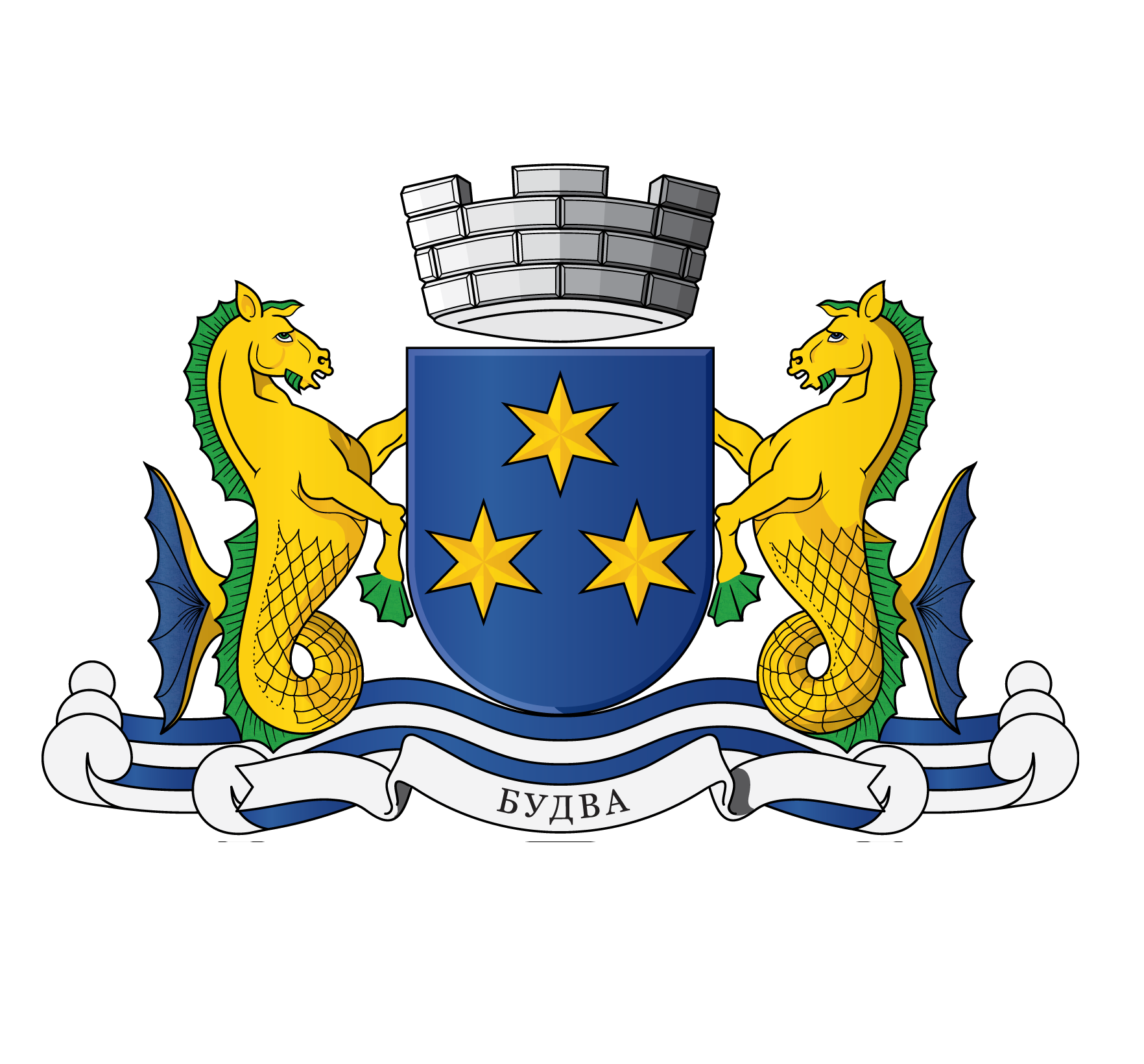 Budva Municipality logo
Budva Municipality logo
Sixteen councilors sign the proposal, three from Crnogorska, 11 from the Democratic Party of Socialists (DPS), one from the Social Democrats (SD), and independent councilor Stevan Džaković.
May 27: Members of the Democratic Front (DF) in Budva file a criminal complaint against an alleged organized criminal group that, as they claim, agreed to replace the government in Budva, with the million-dollar corruption of independent councilor Stevan Džaković. The criminal charges were filed with the Special State Prosecutor's Office and the Chief Special Prosecutor Milivoje Katnić.
The report addresses an unidentified person, who is said to be influential in the DPS, "associated with high-level crime and a bank in Montenegro", and an organizer of a criminal organization. In the application, the DF mentioned many persons from the political, public, and business milieu.
May 28: All 12 councilors of the Democratic Party of Socialists (DPS) Budva come to the local parliament (scheduled for June 30) and vote for the removal of Mayor Marko Carević and the President of the Municipal Assembly Krsto Radović.
At the Ministry of Finance's request, the Commercial Court issues a temporary measure blocking all accounts of the Municipality of Budva to the tune of 29.3 million euros, the amount the German-Austrian company WTE / EVN withdrew from the state account in December 2019 by activating the guarantee. The Municipality of Budva claims that this is a state guarantee, given by the Government of Montenegro for a wastewater project. The contract defines that the local government is not obliged to pay the sum to the state in case of activation of the guarantee.
May 29: The Democratic Front (DF) in Budva announces that the DPS, together with Crnogorska and independent councilor Stevan Džaković, has a plan to "brutally violate the law, statute, and rules of procedure and hold a parallel quasi-session of the Budva municipal assembly to try to remove current government ".
"The freeze on all accounts of the Municipality of Budva best proves this is a joint venture of state bodies, primarily the Ministry of Finance and the Commercial Court, supporting DPS to undo all positive effects of the local fight with organized crime and corruption, "said the DF.
Police officers secure the local parliament session in civilian clothes, causing esentment among the Democrats and the DF members. After the end of the meeting, the police remove independent councilor Stevan Džaković from the improvised hall, waiting for the increasingly disaffected crowd gathered in protest against the violation of the electoral will.
May 30: A session of the local parliament is held in Budva, at which the dismissal of the President of the Municipality, Marko Bato Carević, is discussed. The member of the Democrats of the Municipal Assembly (MA) of Budva, Dragan Krapović, stated that the law had been clear and that the deadline for voting on the removal of Carević had expired.
The next session is scheduled for June 29.
June 3: The Municipal Assembly of Budva does not decide on the dismissal of its President, Krsto Radović, after the legal deadline of 30 days for a declaration expires at midnight.
The Chairman, Gojko Liješević (Democratic Montenegro), schedules the continuation of the session for June 29.
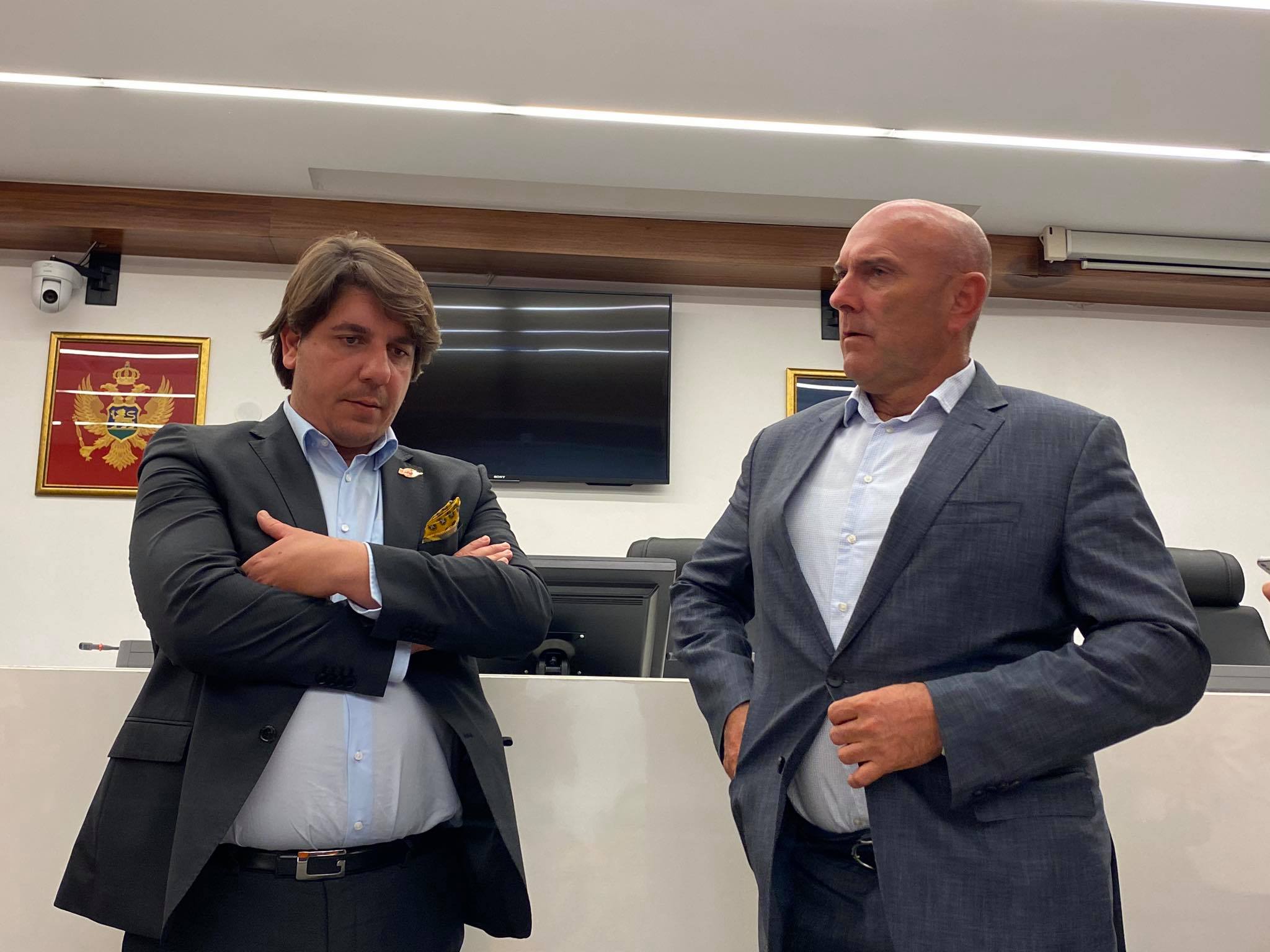
Krsto Radović and Marko Bato Carević, Source: cdm.me
June 5: Seventeen councilors of Budva's Assembly address the Ministry of Public Administration and ask for their opinion on the occasion of two sessions of the local parliament in Budva, held to discuss initiatives for dismissal of Mayor Marko Carević and President of the Municipal Assembly of Budva Krsto Radović, states the DPS.
June 6: The Municipal Board of DPS Budva files a complaint against the responsible persons in the Municipality for violating the law, the Statute and the Rules of Procedure of the Municipal Assembly of Budva, states the President of the Budva Coard of DPS Predrag Jelušić.
June 7: The Budva Committee of Democratic Montenegro announces that it is preparing criminal charges against the President of the DPS committee in the city, Predrag Jelušić, and "other people responsible for the Port of Budva." They are also preparing criminal charges for several other cases, which, as they state, involve Public Enterprise Morsko Dobro and Jelušić as its Director.
The Democrats react to Jelušić's statement that the DPS in Budva was filing charges against those responsible in that Municipality, adding that the DPS "knew very well" that the President of the Budva municipal assembly, Krsto Radović, had complied with all legal deadlines and statutory and business obligations.
The party announces criminal charges against "all those responsible and involved in corruption and the buying of support of councilor Džaković, as well as for false reporting."
June 8: The Assembly Service of the Municipal Assembly of Budva receives a request to convene a session by the newly formed majority in the local parliament, consisting of DPS, SD, Crnogorska, and independent councilor Stevan Džaković. Sixteen councilors sign the request, with 11 signatures needed for its adoption.
June 9: The Ministry of Public Administration assesses that the President of the Municipal Assembly of Budva, Krsto Radović, acted contrary to the provisions of the Law on Local Self-Government and the Statute of the Municipality because he did not allow councilors to vote on the proposals submitted.
The Mayor of Budva, Marko Carević, requests an urgent meeting with Minister of Finance, Darko Radunović, to solve the problem of the million-dollar freeze on the city treasury.
June 11: A new majority in the Municipal Assembly of Budva fires Mayor Marko Carević and President of the Municipal Assembly Krsto Radović. They hold a session in the tourist resort Slovenska Plaža. All 17 councilors of the new majority, consisting of councilors from DPS, SD, Crnogorska, and independent councilor Stevan Džaković, vote for the removal of Carevic and Radovic. Vladimir Bulatović (Crnogorska) is appointed acting President of the Municipality until the election of a new president, and DPS councilor Snežana Kuč is appointed interim President of the Municipal Assembly.
June 16: "Regarding my departure from the position of Mayor of Budva, several legal problems are intertwined. The Constitution of Montenegro states that the will of the citizens is guaranteed. I came to power by the will of the citizens, and now they want to remove me with an election law that violates Montenegro's Constitution. The method of personal mandates is an old tactic of the DPS that has been corrupting councilors for decades and changing the citizens' electoral will by buying them," said the dismissed mayor of Budva, Bato Carević.
The Special State Prosecutor's office investigates the allegations of criminal charges against the officials of the Municipal Assembly of Budva and the Mayor, the Chief Special Prosecutor Milivoje Katnić states at a press conference. He explains that they are acting on corroborating reports from Budva politicians and a statement released by one non-governmental organization.
Carević files criminal charges against three inspectors of the Administrative Inspection, as well as against DPS board member Snezana Kuč and the leader of the Budva Board from Crnogorska, Vladimir Bulatovic, for "abuse of official position, creation of a criminal organization for the violent takeover of power and intrusion into official premises."
Officials of the Administrative Inspection of the Ministry of Public Administration are prevented from filing a decision of the new parliamentary majority in the governmental service of the Municipality of Budva, by which Carević and Radović were dismissed, after which the inspectors ask for police assistance.
June 17: Budva Mayor Marko Carević, his son and brother, Budva Municipal Assembly President Krsto Radović, and five other associates are arrested for failing to allow police to bring administrative inspectors into the municipal building.
The Manager of the Municipality of Budva, Milo Božović, the Secretary for Investments, Mladen Mikijelj, the Head of Carević's cabinet, Nikola Jovanović, and Carević's Advisor, Đordje Vujović, are also arrested.
Municipal officials and citizens gather early that morning outside the Municipality of Budva, as a dozen police vans arrive in Budva. The entire city is under police siege, according to Vijesti.
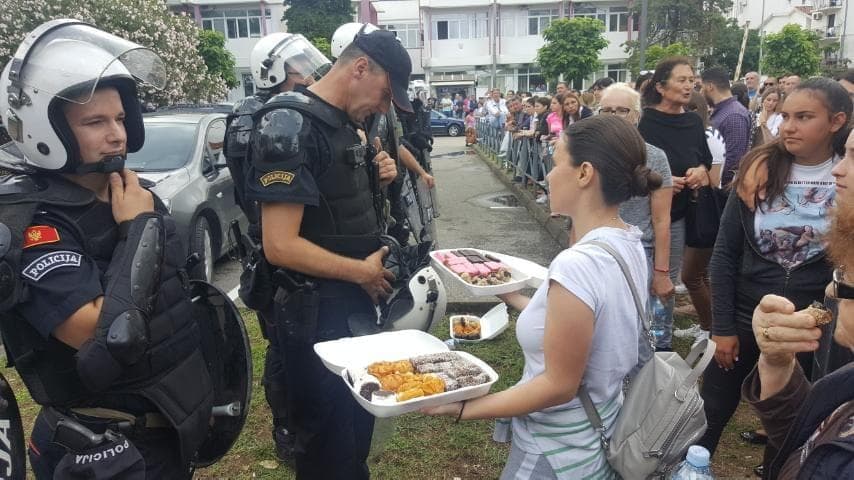 Citizens of Budva Offering Food to Police, Source: RTCG
Citizens of Budva Offering Food to Police, Source: RTCG
On June 16, the Administrative Inspection of the Ministry of Public Administration issues a decision ordering that the new majority be granted access to the Municipality and documents. Carević and Radović do not recognize those decisions. They claim that they are illegal and do not allow the newly elected officials to enter the Municipal building and have access to documents. They state that the political crisis in Budva has come after councilor Stevan Džaković, who was on the list of the Democratic Front, decided to support the opposition, which in that Municipality consists of the Democratic Party of Socialists and the Montenegrin Party. The sacked leadership claims that this is political corruption.
The Vijesti portal states that the police applied an inappropriate degree of force and tear gas against the municipal officials and citizens and that the windows on the municipal building were broken. The most significant reastions from the media were caused by the recording of the police's actions towards the former Secretary for Investments of the Municipality of Budva, Mladen Mikijelj.
Carević, Radović, and other officials of the Municipality of Budva are released later in the afternoon. Radović states that the entire public could see that Montenegro does not have a Constitution and that legislation and the rule of law have been suspended and subordinated to the greatest dictator Milo Đukanović.
The Vice President of the Democrats and councilor Dragan Krapović calls on the citizens to remain persistent and stay, and calls on representatives of all parties to come to Budva. As he states, democracy is being defended there.
He says that the municipal officials in Risan hospital were found to have injuries inflicted on them by the police during the detention, but that they were generally well.
Krapović sends a message to the international community to take into account of what is happening in Montenegro. "Do not keep silent on the unpleasant scenes of Milo Đukanović's military junta," he said.
June 20: There are almost eight million euros in the account of the Municipality of Budva, but the money cannot be used as long as the temporary measure of the Commercial Court is in force at the end of May at the request of the Ministry of Finance. However, during the political crisis, when there are "two authorities" in the city, which have started a dialogue to overcome tensions and calm passions, resolving the account blockade will have to be a priority. During the talks, political representatives are forbidden to make any political statements and thus raise tensions, and prevent an agreement. The Commercial Court has not yet ruled on the objection lodged by Marko Carević's administration against the interim measure, blocking bank accounts.
June 22: Snezana Kuč schedules consultations with the presidents of the committee groups on Thursday, June 25, on the occasion of the next session of the parliament, on the current political situation.
In the invitation to the councilors' groups, it is stated that the topic of the meeting is consultations related to the work at the next session of the Municipal Assembly of Budva and the conversation regarding the current political situation.
The leader of Montenegro, Vladimir Bulatović, leaves the building of the Municipality of Budva, where he talks with the DPS councilor Snežana Kuč and President of the Municipality, Marko Carević. The meeting ends without an agreement. The Municipal building meeting is briefly attended by the President of the Municipal Assembly, Krsto Radović.
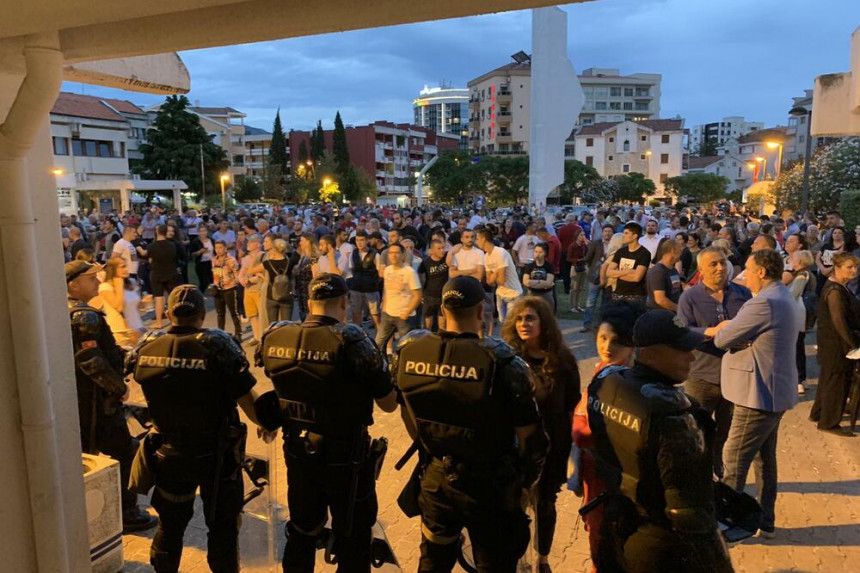 Civic Protests in Budva, Source RTV BN
Civic Protests in Budva, Source RTV BN
On that same day, deputies and councilors of Democratic Montenegro break through the cordon of private security in the Municipal Assembly (MA) of Budva, who had been hired the day before by the acting President of the Municipality, Vladimir Bulatović.
The President of the Municipal Assembly of Budva, Krsto Radović, invites those who want to resolve the political situation in Budva to come to the Municipal building. He tells people gathered in front of the Municipal building that the leader of Montenegro, Vladimir Bulatović, "confirmed that he had ordered" his arrest and that of President of the Municipality, Marko Carević. Radović calls on those gathered to remain peaceful and not to attack the police.
Marko Carević, Krsto Radović, leader of the Democrats, Aleksa Bečić with eight deputies, as well as four deputies of the Democratic Front, Slaven Radunović, Marina Jocić, Milun Zogović, and Jovan Vucurović, are in the building of the Municipality, as well as municipal officials and councilors, and police inspectors.
June 23: Carević and Radović state that they have received word from the police that no one will be able to enter the building of the Municipality of Budva, and ask the gathered citizens to disperse.
Representatives of the local government and representatives appointed by the new majority of councilors a few days earlier as acting presidents of the Municipality and the President of the municipal assembly, will not be able to enter the municipal building. Carević asks the police to provide him with a document stating that the Municipality was closed.
The legal representative of the Municipality of Budva, Vladan Bojić, says that something that unforeseen had happened that day, that the Municipality had been turned into a police station.
"For the first time, the police are closing down the local government and unconstitutionally preventing workers from coming to their jobs. It is a sure way to ruin an unreasonable decision that is direct to the detriment of citizens. This is a violation of the Constitution because workers are forbidden to come to work." said Carević.
The Municipality of Budva is not provided with official information based on which the police forbid everyone to enter, which was also confirmed by Vladimir Bulatović, who tells Vijesti that he has not received any document.
June 24: On the occasion of the invitation of the DPS and Montenegro for mediation in Budva, the EU Delegation to Montenegro tells "Vijesti" that they have nothing to add to the statement of the EC spokesperson Anna Pisonero Hernandez.
She states that the EU welcomes the dialogue in Budva and calls on all political actors to show respect for the rule of law and democratic principles and to show political maturity to find a sustainable solution to the current situation through dialogue and mutual respect.
The leader of Crnogorska, Vladimir Bulatović, sends a letter to the security service asking security to prevent all employees from entering the building of the Municipality of Budva, except those listed. Bulatović, who has signed as acting President of the Municipality of Budva, bans councilors from entering until further notice.
Economic crime inspectors enter the building of the Municipality of Budva and begin control of the members of the security.
In Budva, police deploy tear gas after a warning is issued to citizens who have surrounded the police station to disperse.
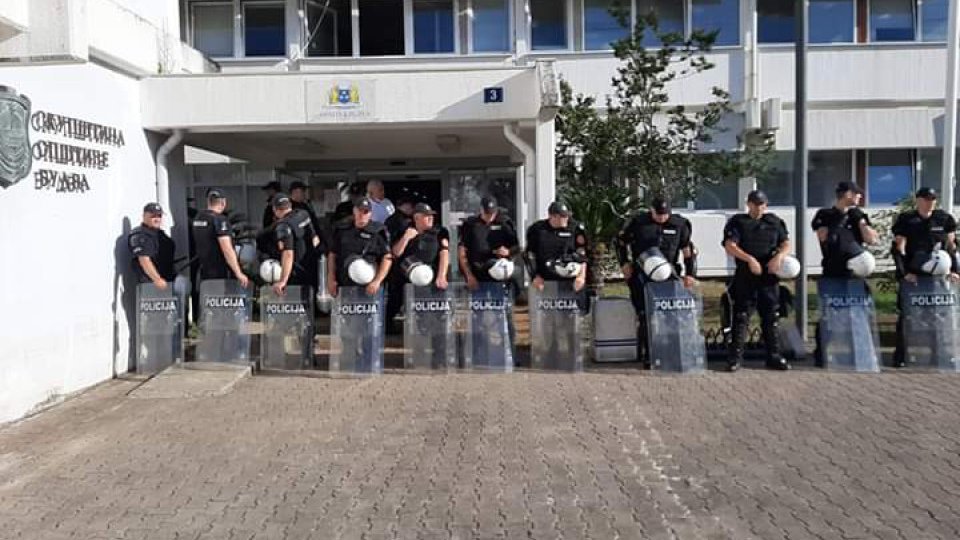
Special Police Forces in Budva, June 24, Source: Vijesti Online
After being arrested earlier that day, Carević and Radović, as well as DF councilors Đorđije Vujović and Đordje Pribilović, and SNP councilor Krsto Radjenović are released. Among those detained are the Vice President and councilor of the Democrats, Dragan Krapović, the Head of Carević's Cabinet, Nikola Jovanović, and the Manager of the Municipality, Milo Božović. Not far from the police station, famous boxer Nikola Sjekloća is also arrested. The Head of the Protection and Rescue Service, Dragan Božović, and the Head of the Utilities Collection Service, Ninoslav Kaludjerović, are also detained.
After 5.30 pm, tear gas is thrown outside elementary school "Stefan Mitrov Ljubiša", and then at the crossroads, where riots break out. Stones are thrown at the police station, and tear gas is thrown into the hall of the Sports Center during children's training.
Members of the Special Police Units come to the official parking lot of the Municipality of Budva before and after citizens have gathered because the end of working hours was approaching. They await the departure of acting presidents of the Municipality and the Municipal Assembly, Vladimir Bulatović and Snežana Kuč, from the Municipality premises.
June 27: A new majority of councilors in the Municipal Assembly of Budva elect DPS MP Nikola Divanović as the President of the Municipality of Budva.
Andjela Ivanović (Crnogorska) is elected President of the Budva municipal assembly by 17 councilors - 12 DPS councilors, three Crnogorska's councilors, one Social Democrat (SD) councilor, and Stevan Džaković, an independent councilor.
The decision is not recognized by a coalition of the Democratic Front (DF), Democratic Montenegro, the Civic Movement URA, the Socialist People's Party (SNP), and the Social Democratic Party (SDP).
The session is marked by chaos, including physical clashes between political opponents, which lead to five opposition councilors being taken to the police. Vijesti states that DF councilor Milan Šoljaga tried to enter the session, but private security did not allow him to do so.
The media are not allowed to attend the Municipal Assembly of Budva session at which Divanović and Ivanović are elected. However, the rules of procedure of the local government body prescribe that the meetings are public and must be open to journalists.
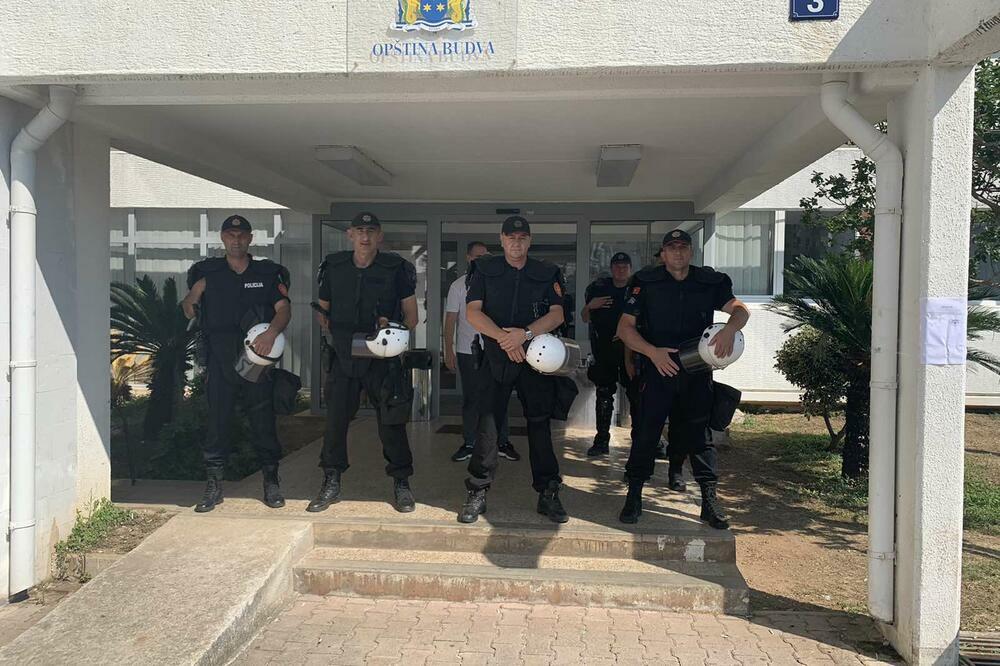
Police Forces in front of the Municipality of Budva, June 27, Source: Vijesti Online
The Media Union of Montenegro (SMCG) strongly condemned the actions of the private security team that was engaged in the building of the Municipal Assembly of Budva, which during the session of the local parliament forcibly and inappropriately expell Pobjeda journalist Đurđica Ćorić from the municipal premises.
The Budva Board of the Democratic Front (DF) states that Nikola Divanovic (DPS) is the self-proclaimed President of the Municipality of Budva and that the Democratic Party of Socialists (DPS) in Budva have shown the kind of democracy from the golden age of the regime of former Romanian leader Nicolae Ceausescu.
DPS MP Nikola Divanović claims that he is the legitimate President of the Municipality of Budva because the parliamentary majority had voted for him. He says that he will start working on solving the problem on Monday, promising that there will be no revanchism and that everyone who wants to work has a place in his team.
June 28, 2020 - Specific dates for opening borders alongside measures introduced by competing countries have meant that some tourists, who would otherwise have preferred to come to Montenegro, have already opted for destinations such as Croatia, Turkey, Greece, Albania, Egypt and Tunisia.
Montenegro is currently open to more than 100 countries, but more than 70 percent of them are not the markets from which most guests come. According to the Association of Hotels and Apartments of the Municipality of Ulcinj, the more favorable entry measures introduced by Albania have led to up to 90% of their tourist capacity being filled, compared to last year.
The situation in Croatia is similar to Montenegro’s, yet as a European Union member it must adhere to the measures prescribed by the EU.
Criteria
Montenegro is currently open to countries with fewer than 25 active cases per 100,000 population. The problem with this criterion is that on any given day the criterion may be fulfilled, and yet in five days’ time it may no longer be. In the meantime, flights have been arranged, sales have been agreed, and packages sold to tourists, yet five days later everything has to be cancelled. In order to save the economy, the tourism industry is proposing the abolition of the PCR test when tourists enter, with stricter controls.
Given this situation on the tourism market on the one hand, and the significant impact that tourism has on the economy of the country on the other, the tourism industry expects the competent institutions in Montenegro to find sustainable solutions that will allow economic activities to make the most of the rest of the tourist season.
As the "Fly Montenegro" agency claims, the current measure cannot be applied from the point of view of specifying flights, because countries that meet that criterion can be on the list of banned countries again by the time of the scheduled flight, e.g Poland and Israel.
"Competing countries (Croatia, Turkey, Greece, Albania, Egypt, etc.) do not have the criterion of 25 active patients per 100,000 inhabitants but have either fully open borders, with certain measures to implement distance and mandatory wearing of masks when entering (Albania, Greece, Croatia, Egypt, etc.), or carry out tests for incoming passengers (Turkey)," Fly Montenegro states.
According to their information, in addition to the aforementioned measures, Croatia and Albania have introduced filling in forms upon entering the country. The purpose of the form is to know where an individual will be staying, and the date of arrival and departure in order to monitor the situation and controls. In Tirana, forms are filled out manually during the flight, to avoid crowds on landing. Croatia has created a web application through which passengers can fill in the required information before arriving in Croatia in order to avoid waiting at the airport.
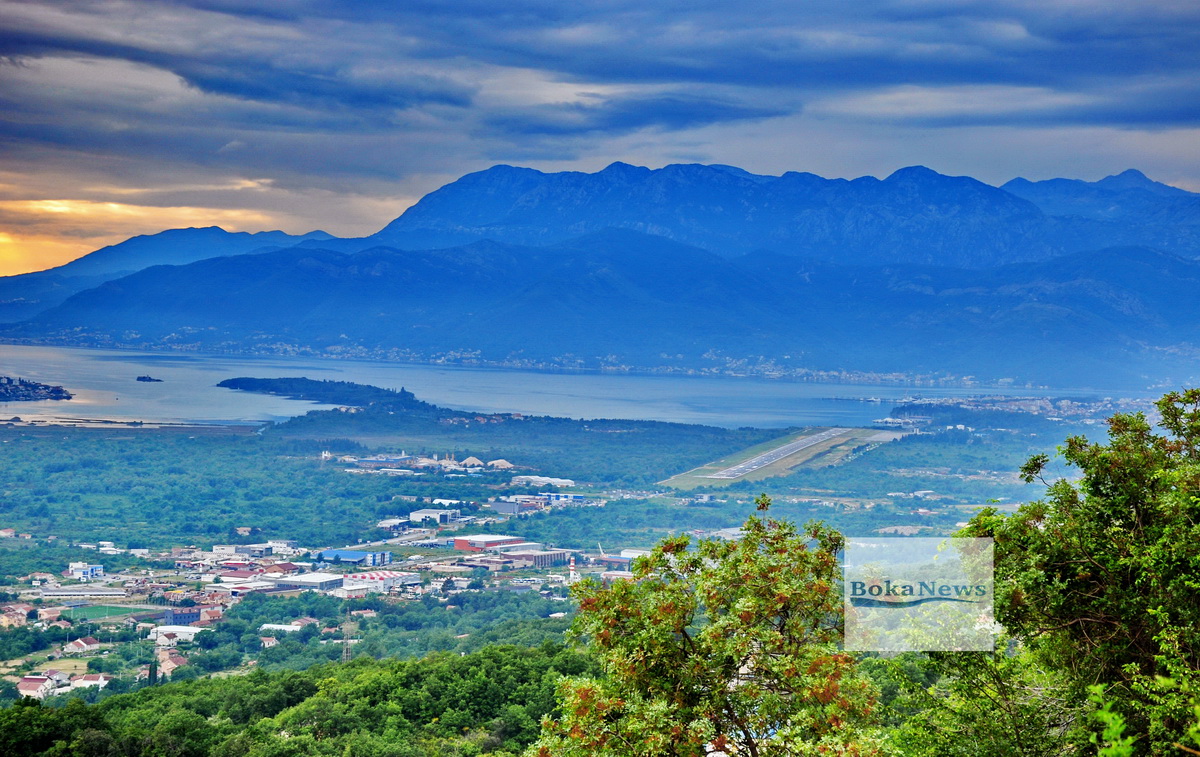
Tivat - Photo Boka News
The Association of Hotels and Apartments of the Municipality of Ulcinj recently appealed to the Government to open the borders and allow unimpeded entry and stay of persons from the countries of the region because, as they say, the economic situation is very difficult.
The President of the Association, Fuad Lunji, claims that in Albania, compared to last year, 80 to 90 percent of the capacity is currently filled and that they are doing fairly well, adding that many of their tourists had wanted to stay in Montenegro.
“Tourists as tourists have an alternative and why would they go somewhere where it is closed and pay for a PCR test, when they can go somewhere that is completely open and pay nothing. We cannot be too smart and not be able to establish that,” Lunji stated.
He suggests that with increased controls at border crossings, tourists should be allowed to enter without tests.
“Every person in Montenegro depends directly and indirectly on tourism, especially those of us on the coast who depend on tourists from the entire region: Bosnia and Herzegovina, Serbia, Kosovo, Albania, North Macedonia - these are our markets. We were the only ones to make a PCR test compulsory. I agree that the situation is bad, and it is a pandemic, but I think we have a much worse economic situation heading towards us. I feel sorry for all the people who get sick, people who die, but believe me, a huge catastrophe awaits us when all this stops,” Lunji believes.
His hotel "Salina" in Ulcinj currently has no guests. While the borders were temporarily open without a test, he says they had full weekends of tourists from Kosovo. However, he now claims that their situation was better in November and December last year than now.
“We have to find a way out and make the best of the situation, whatever the disease turns out to be,” Lunji thinks.
Interest
Travel agency "Fly Montenegro" spoke to Pobjeda, saying that apart from the region, there is a huge interest from tourists from Belarus and Ukraine, from where about 100,000 tourists came to Montenegro last year. Flights from these countries are now being diverted to Albania precisely because of the measures.
“The fact is that due to the global crisis caused by Covid-19, we cannot expect significant numbers from Western European countries this tourist season, because they are telling everyone to spend their summers in their countries. So our potential traditional incoming markets remain primarily Belarus, Russia, Ukraine, our region, Poland, the Emirates, the Czech Republic, Israel and others,” claims Fly Montenegro.
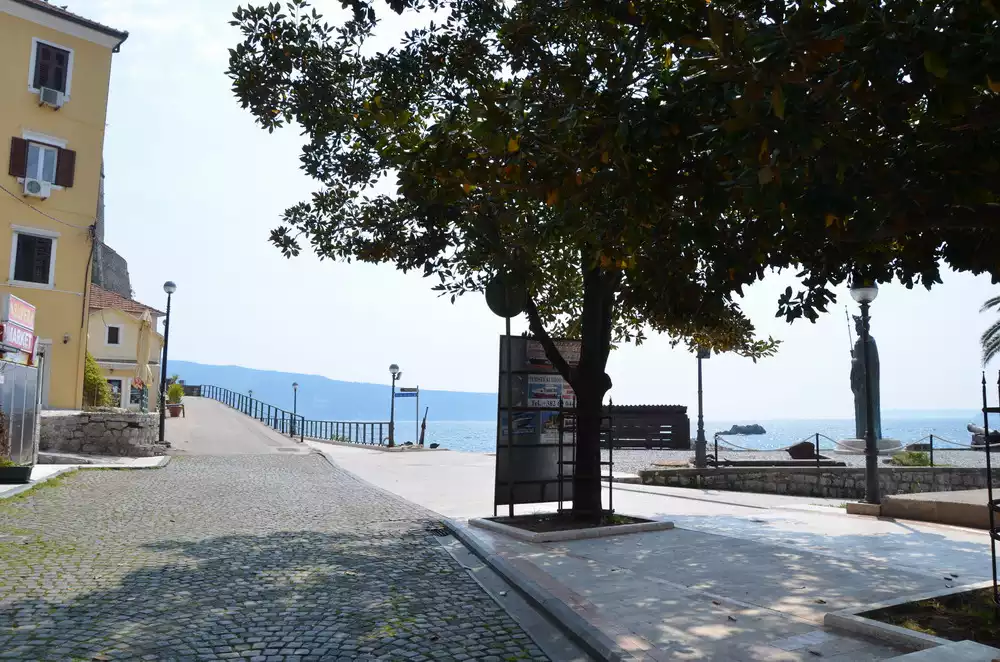
Herceg Novi during coronavirus
It is especially important, they say, to consider measures of competitors in the tourist market (Croatia, Turkey, Greece, Albania, Tunisia, Egypt, etc.), which over time are taking more and more tourists from the traditional incoming markets and are therefore decreasing the chances for some sort of rescue for at least part of the tourist season.
“We already have seen a number of examples where flights from Belarus that were planned for Montenegro were redirected to Albania, where the first flight arrived on 12th June. The first flights from Minsk, which were planned and sold to Tivat in mid-June, were diverted and landed in Tirana. The flight was welcomed at Tirana Airport by the Minister of Tourism of Albania. Belarus is not yet on the list of countries from which it is possible to come to Montenegro because they have more than 25 active patients per 100,000 inhabitants, which is completely realistic considering that mass tests are performed in that country, between 15,000 and 20,000 a day,” states Fly Montenegro.
They add that for now, flights from Minsk to Tivat have been moved to start on 10th July.
“If a sustainable solution is not found, the airline Belavia will be forced to completely cancel flights to Montenegro this year and redirect all its flights to competitive markets. How important the Ukrainian market is is best shown by the fact that negative PCR tests for Ukrainian tourists are not required by Croatia, Albania, Greece, Turkey or Egypt,” said Fly Montenegro.
Barrier
As they explain, the last change according to which Ukraine was put on the list of countries from which tourists can visit Montenegro, but with the obligatory negative PCR test not older than 48 hours, cannot be applicable to tourist arrivals for two reasons.
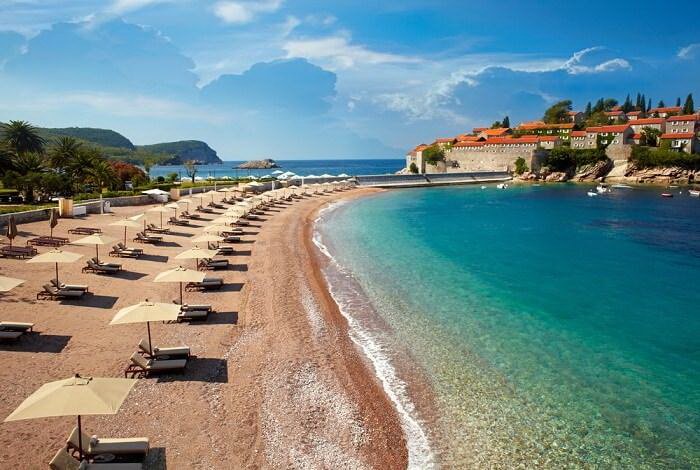
Beach - tourism
“The first is of a technical nature because in Ukraine the minimum turnaround for PCR tests is 72 hours or longer, as the number of laboratories that issue PCR tests is limited. The second is economic in nature because the PCR test costs about 80 euros, which automatically removes us from the market as competing countries can attract them by not insisting on a negative PCR test. For example, a family of four has to pay over 300 euros for tests alone, and there are huge queues for PCR testing. In addition, no one can guarantee that the tests will be issued between the 48 and 72 hours as required by us, and therefore tourists opt for competing countries where there are no such requirements,” the agency clarified.
The outcome of this situation, they say, is that the planned flights from Ukraine to Montenegro from 1st July have been cancelled.






